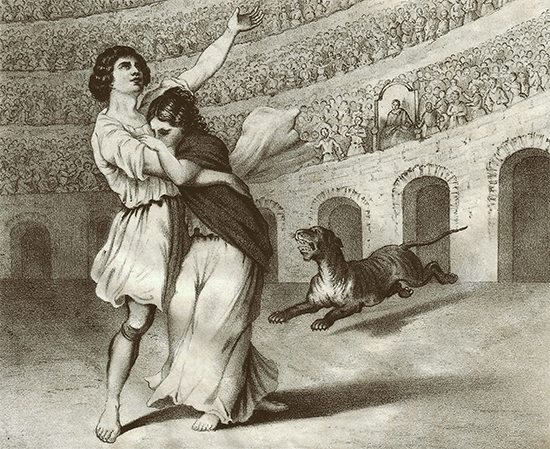
December - January 2023
Lighting the Darkness
------------------
|





PRIMARY SOURCE: Bloodlust and a Modest Lady
“Blessed is the man that walketh not in the counsel of the ungodly, nor standeth in the way of sinners, nor sitteth in the seat of the scornful” (Psalm 1:1).
Stepping into the arena, she smelled the blood in the sand. She heard the crowd’s frenzied roar and saw the men who awaited her, helmeted and armed for killing. No one doubted the outcome. Following Christ was not only illegal but also lethal. The very name gladiator derives from the Latin, gladius, sword.
The Roman government fed the bloodlust of the population. Glitz and gore were regularly on tap, and the people drank it in. Even plays sometimes had real death scenes where condemned criminals played the unfortunate roles.
Gladiatorial “spectacles” took place in amphitheaters. Theaters fanned out 180°. Amphitheaters made a complete circle. All kinds of warfare were available for viewing. Promoters sometimes filled arenas with water for naval battles. Venationes, wild animal hunts, pitted man against beast, with no guarantee who would survive.
Crowds ranged from 7,000 to 18,000. Rome’s Colosseum, the Super Bowl of the ancient world, could accommodate 50,000. Events came complete with season tickets, scalpers, and some sleeping by the gates the night before to guarantee getting in.
Passions ran high on the arena floor: the hunted filled with fear, the hunters with bloodlust. Violence sometimes erupted in the stands. An A.D. 59 riot among the audience in Pompeii resulted in a ten-year ban on the games. In Rome, Nero kicked Poppaea to death because she complained about his coming home late from the games. Historian Alison Futrell explained: “Watching violence runs the risk of drawing the spectator into the action, transforming him from a vicarious participant to an agent of violence himself.”
Having attended “spectacles” in his pre-Christian days, Tertullian struggled to write against them because it “set memory a-working.” Even past sin has its allure. Some Christians, he said, demanded “direct authority from Scripture for giving up the shows.” He responded: “Well, we never find it expressed with the same precision, ‘Thou shalt not look on combat or show’; as it is plainly laid down, ‘Thou shalt not kill.’” But, he argued, we do find David saying, “Blessed is the one who does not walk in step with the wicked or stand in the way that sinners take or sit in the company of mockers.”
“Here,” the church father said, “you have an utterance which is not far from a plain interdicting of the shows....Every show is an assembly of the wicked.” Tertullian also sarcastically asked whether watching fights would help the Christian learn to turn the cheek. Overall, he concluded: “How monstrous it is to go from God’s church to the devil’s—from the sky to the stye.”
This provides background to our Christian lady in the arena. We know basically nothing about her except that she fell to the gladiator’s blow. The historian, however, did record one more fact: This unnamed believer, while falling, arranged her skirt to avoid being immodest in her death.
For further reading:
About the Columnist: Paul V. Harrison has pastored Madison FWB Church in Madison, Alabama since 2015. Previously, he pastored Cross Timbers FWB church in Nashville, Tennessee, for 22 years. He was an adjunct professor at Welch College for 17 years, teaching church history and Greek. Paul is the creator of Classic Sermon Index, a subscription-based online index of over 66,000 sermons, with clients including Harvard, Baylor, and Vanderbilt, among others: classicsermonindex.com. |
| |
|

